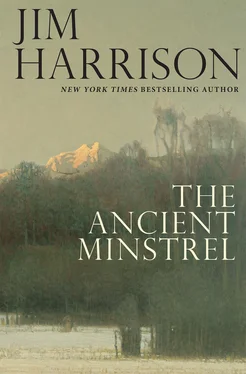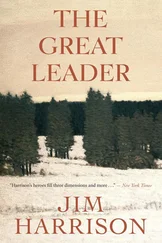She walked back to her car feeling rather light-headed after performing a comic marital scene. “Finishing a screenplay” became a family joke whenever she wanted to torment him or truncate one of his prepared marital speeches.
Later on when he thought about this event his heart gave an extra thump and he felt lucky that he hadn’t shit his pants. A few days later, after his class on the modern novel, the girl said that her ass was covered with mosquito bites. This turned him on and he wanted to see the bites but she said, “Nothing doing. I better get an A or I’m telling your chairman that you’re a sexual deviant.” She knew her power and didn’t bother writing a term paper. She merely doodled on her finals. He couldn’t blame her, wondering how she had made it home half nude. Later he found the pistol with difficulty in the woods. It was a keepsake to him. It had been his father’s and grandfather’s, an old-fashioned Colt revolver. The story was that his grandfather had shot at a neighbor he suspected of setting fire to his barn. The neighbor moved away with a hole in his leg which ended the argument.
He grew quite tired of the early beliefs that he felt were forced upon him. His mother had pounded into him certain children’s books of a semireligious nature. One of them maintained that above all he must be “strong, brave, and true.” To his usual questioning his mother was hasty in her explanations. To her all of his questions had become maddening because she frequently could see that he didn’t believe her answers. “How do birds fly?” was a killer that she left to her husband. They went to the town library and checked out many helpful texts. He recalled from walking in the woods that when you picked up a dead bird it was startling how light it was, even a comparatively large crow. Strong, brave, and true wasn’t so hard except for “true” which remained something of a mystery. “Strong” had always been the easiest because at his father’s insistence even as a boy he exercised relentlessly so as not to become “puny,” an ugly word his father used. He also worked and would weed gardens and mow lawns for fifteen cents an hour. He disliked washing cars so he charged a full quarter for that. He became by far the strongest boy in his class at school and well into his forties he could beat the workingmen at arm wrestling contests at the tavern.
Of course he knew that strength of this sort was quite irrelevant in today’s world. Nothing beyond the ability to depress a computer key was wanted, except if you worked in construction or needed a cement block layer which he had been after he flunked out of graduate school. They lived a threadbare existence because back then out of pride he had refused to let his wife take any money from her well-off parents. It was utterly brutal work, especially in cold weather. You added a little salt to the mortar if it was below freezing though this was illegal or dishonorable as it weakened the bind between blocks. Once he was shivering so hard holding up an eighty-five-pound corner block that he dropped it, crushing several toes. At emergency they had to cut off his heavy Red Wing boot. During his recuperation, brief because they were broke, he made the understandable decision to return to graduate school to get a master’s degree. The department was pleased to accept him back because he had published a first book of poems with W. W. Norton and a novel with Simon and Schuster. Later on he frequently regretted what a heartless prick he had been. Success didn’t help that much because it couldn’t wipe away the years of bad behavior. In one shabby rental house he kept the thermostat at fifty-five degrees because they couldn’t afford much fuel. Why suffer from cold due to pride?
Their first child Robert died almost immediately from a bad heart. They had two daughters, one ten years after the other, who were the joy in their life. But when they married and left home he was saddened thinking, “What now?” There was always alcohol. What saved his sorry neck was buying a fairly remote cabin in Michigan’s Upper Peninsula as a place to escape to. Typical of him, he didn’t even go inside the cabin before he bought it. Since he obviously didn’t care for the human race to speak of he kept happy with the profusion of birds and the more than occasional bear that entered the yard to rob the bird feeder. A bear would take a big mouthful of sunflower seeds then become ruminative as he chewed. He got to know one old male so well that when he came home from the tavern late at night quite polluted he’d stop on his two-track driveway, the bear would approach and put his chin on the windowsill, and he’d scratch his ears. This was admittedly stupid and when he learned more about bears from his friend Mike he stopped doing it. He’d leave out any surplus of fish on a stump at least a hundred yards from the cabin. Finally, the old male no longer visited and he deduced that it had died of old age or had been shot by the oversupply of bear hunters who visited the area each fall with their hounds.
Both of their daughters moved to Montana and after a few years of loneliness and longish late-summer trips he and his wife gave up on the beauties of ever more crowded northern Michigan, sold the farm, and moved to Montana. It was harder for his wife than for him. She made all of the moving arrangements and could only find an unpleasant rental to stay in for the few weeks of searching for a house. She found a big farmhouse on about thirty acres and she made extensive remodeling plans with carpenters and then returned to their little casita near the Mexican border for the fall, winter, and cold rainy early spring.
Eventually despite his wife’s caution he was sprung forever from teaching by screenwriting which gradually became its own hell because out of pure greed he took on too much work. He couldn’t quite believe he was making so much money but there was absolutely no positive emotional quotient to the money. It largely depressed him. A morning phone call from Hollywood could ruin a day’s work. During these years in Montana he fished constantly, a boyhood obsession, but occasionally missed the morbid routine of teaching. Years before he had been hired at Stony Brook out on Long Island through the graces of an ex-professor who had become powerful. The work was very easy. He taught only one course and also assisted the chairman. He had a corner office into which he moved an easy chair. No straight back chairs were in the office. The easy chair was awkward for the countless professors who came in to complain about the injustices of teaching. The chairman allowed him to decide who taught what and he was widely disliked for his arrogance. He taught one very popular course in twentieth-century poetics, which was the real reason for the easy chair. At the time miniskirts were obligatory and attractive girls from his class would come in and plop in the deep chair. The visuals were wonderful.
With his students he was sometimes coarse and abusive when they asked him for writing advice. He had been hired to teach recent American literature not creative writing. He had gotten off on the wrong foot with his colleagues over and over by maintaining Gabriel García Márquez was an American writer in the larger sense. Both north and south of the United States were the “Americas” including Canada. Objections surrounded him but he didn’t care because his work was doing very well. It was up to Margaret Atwood if she wanted to be American or Canadian not the English professors of the world.
He would act in the manner of Leo Tolstoy who, when Rilke told him he must write, said, “Then write for God’s sake.” Even nastier was Faulkner who in answer to the question of what a writer needs said, “Paper and pencil.” In other words, figure it out for yourself, there are no shortcuts. You have to give your entire life to it.
Читать дальше












